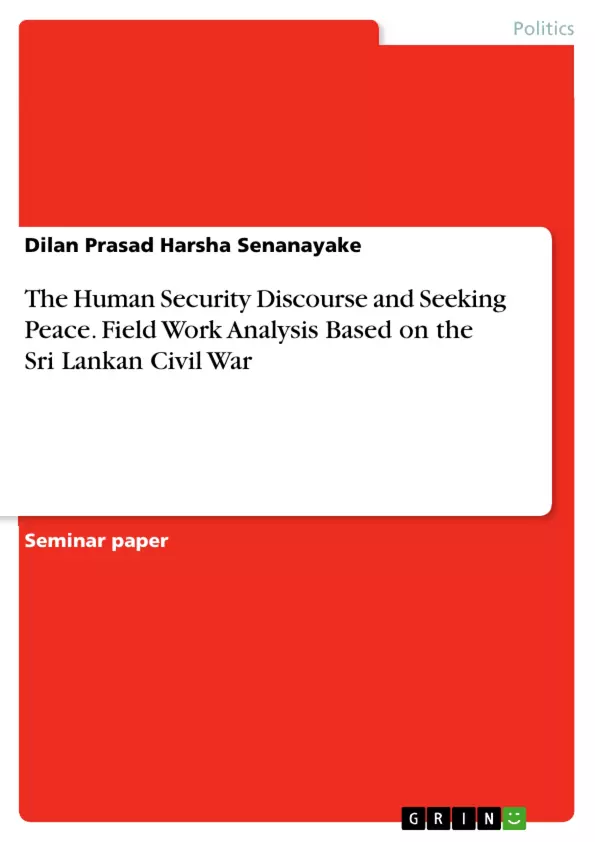There have been series of attempts to resolve the civil war peacefully by political arrangements until the Rajapaksa regime decided to declare war against LTTE in 2006. The first peace rounds were marked by Bandaranaike and Chelvanayagam in 1957. The Senanayake- Chelvanayagam peace talks in 1965 followed by Round Table conference 1983, All Party conference 1984, Thimpu Bhutan talks in 1985, Political Parties conference of 1986, Indo Sri Lanka Accords, All Party Conference of 1989, Dialogue with the LTTE in 1990, Select Committee of Parliament, Jaffa Peace talks of 1995 and Ceasefire agreement and peace talks in 2001. The entire peace process in Sri Lanka failed in finding a political solution to the ethnic conflict. Particularly, the Indo- Sri Lanka Peace Accords and the 2002 Peace process were able to gain international attention. However, the failure of the peace process changed the political map of Sri Lanka in a larger context. The failure of 1987 and 2001 peace activities problematized the international involvement in the peace process in Sri Lanka. With these contextual annotations, the author looks at the catastrophe of the peace process of Sri Lanka through two case studies: 1987 Indo- Sri Lanka Peace Accords and 2002 Peace rounds. The final portion of the paper describes the linkages between human security approach and peace agreements in Sri Lanka.
Inhaltsverzeichnis (Table of Contents)
- Introduction
- Review of Literature
- Background note on 1987 Indo- Sri Lanka Peace Accords
- Background note on the Peace Process in Sri Lanka (2002-2006)
Zielsetzung und Themenschwerpunkte (Objectives and Key Themes)
This paper examines the failure of peace processes in Sri Lanka through the lens of the 1987 Indo-Sri Lanka Peace Accords and the 2002 peace rounds. It analyzes the role of international mediation and power dynamics in the context of ethnic conflict, highlighting the limitations of peace agreements in addressing underlying issues and achieving lasting peace.
- The failure of peace processes in Sri Lanka
- The role of international mediation in peace agreements
- Power dynamics and ethnic conflict
- The limitations of peace agreements in addressing underlying issues
- The human security approach and its relevance to peace agreements
Zusammenfassung der Kapitel (Chapter Summaries)
The first chapter provides an overview of the historical context of the Sri Lankan civil war, tracing the attempts at peace through political arrangements from 1957 to 2006. It underscores the failure of these attempts in finding a lasting solution to the ethnic conflict, particularly the Indo-Sri Lanka Peace Accords and the 2002 peace process. The paper utilizes these two case studies to analyze the catastrophe of the peace process in Sri Lanka.
The second chapter focuses on the 1987 Indo-Sri Lanka Peace Accords. It explores the political background of the agreement, highlighting the influence of the Sinhala Buddhist majoritarian ideology and the marginalization of the Tamil community. The chapter examines the limitations of the accord in addressing the political demands of the Tamil population and the role of Tamil militant groups in undermining the peace process.
The third chapter delves into the 2002 peace process, focusing on the role of Norwegian mediation and the challenges it faced. It discusses the power asymmetry between the LTTE and the Sri Lankan government, as well as the impact of the conflict on the Muslim community. The chapter also analyzes the divisions within the Sinhala majority community and their role in hindering the success of the peace process.
Schlüsselwörter (Keywords)
The key concepts and themes explored in this paper include the Sri Lankan civil war, peace processes, international mediation, power dynamics, ethnic conflict, human security, and the limitations of peace agreements in achieving lasting peace.
Frequently Asked Questions
What were the key peace processes in the Sri Lankan Civil War?
Significant attempts include the 1987 Indo-Sri Lanka Peace Accords and the 2002 peace rounds mediated by Norway. Both aimed to find a political solution to the ethnic conflict.
Why did the 1987 Indo-Sri Lanka Peace Accords fail?
The accords faced resistance from Sinhala Buddhist majoritarian groups and failed to fully address the political demands of the Tamil community, while militant groups like the LTTE undermined the process.
What was the role of Norway in the 2002 peace process?
Norway acted as an international mediator, facilitating a ceasefire agreement and peace talks between the Sri Lankan government and the LTTE (Liberation Tigers of Tamil Eelam).
What is the "human security approach" mentioned in the paper?
The human security approach focuses on protecting individuals rather than just states. The paper analyzes how this approach relates to the success or failure of peace agreements in addressing grassroots needs.
How did power dynamics influence the failure of peace?
Power asymmetries between the government and militant groups, along with internal divisions within the Sinhala majority, created obstacles that political arrangements could not overcome.
When did the Rajapaksa regime declare full war against the LTTE?
The regime decided to declare war in 2006, marking the end of the series of peaceful political arrangements attempted over several decades.
- Quote paper
- MA International Relations Dilan Prasad Harsha Senanayake (Author), 2018, The Human Security Discourse and Seeking Peace. Field Work Analysis Based on the Sri Lankan Civil War, Munich, GRIN Verlag, https://www.grin.com/document/442861



